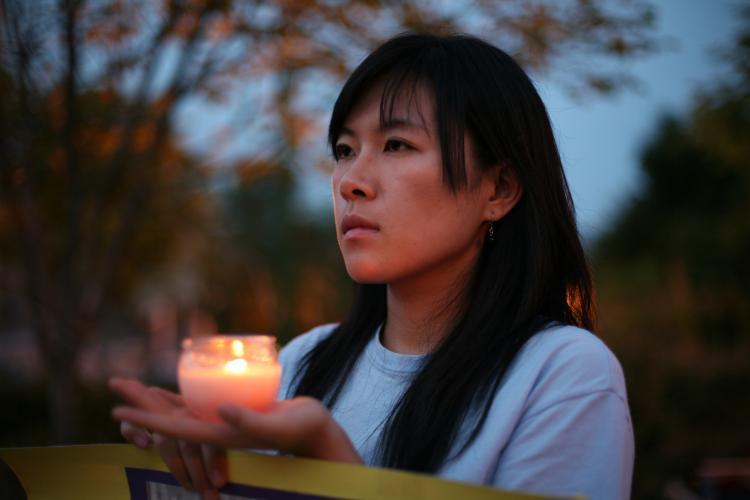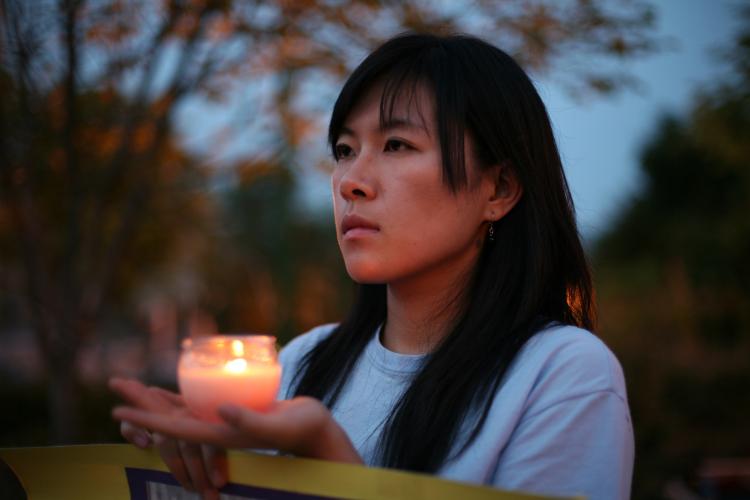WASHINGTON—A hush in the air settled on the corner of International Place, a street lined with new embassies in Washington, D.C. on July 30.
From within the Chinese Embassy small groups of guests trickled out. They were mostly military representatives from other embassies in D.C., leaving a reception commemorating the 82nd anniversary of the People’s Liberation Army—the army responsible for massacring students in Tiananmen Square in 1989.
Across the street, a group of Chinese now living in America, were not welcome in the embassy, nor would they enter. The embassy belongs to the regime responsible for torturing and persecuting their family members.
Jin Pang, one of the Falun Gong practitioners who had gathered to quietly appeal, lost her mother and aunt to China’s vast re-education-through-labor camp system earlier that day.
Both had just been sentenced to more than seven years in prison for practicing Falun Gong. Jin has not had contact with her mother since the arrest and said that no family members have been allowed to speak to or see her.
“We see the reception [at the embassy] and we do hope the guests know the truth,” said Hailan Zhang, a friend of Jin Pang’s.
The Chinese Communist Party has been waging a brutal persecution of Falun Gong, a spiritual meditation movement, since 1999. According to FalunInfo.net, over 3000 deaths have been documented, as well as over 63,000 accounts of torture—an estimate of the actual death toll is expected to be in the tens of thousands.
“We hope the guests will position themselves with the people who really need help—like Jin Pang’s family members,” he said.
Jin’s 51 year-old mother and 53 year-old aunt have both been practicing Falun Gong for more than 13 years—starting four years before the persecution was launched by former Chinese communist party leader Jiang Zemin in 1999.
According to Jin, her mother took up Falun Gong because of a severe case of the skin disease, dermatosis. Nothing seemed to alleviate the illness, despite her trying many different medicines over the years. Hearing about Falun Gong and its associated health benefits, she started practicing.
Her illness faded quickly, said Jin. “Also, her temper softened.”
July 28 was not the first time Jin’s mother had been arrested. Last year, in the pre-Olympic sweep, her home was ransacked by China’s Public Security Bureau and she was taken away.
Jin said more than 100 Falun Gong practitioners were arrested that same day. The Falun Dafa Information Center, received reports of more than 8,000 practitioners being detained in 2008 and 104 dying as a result of persecution—in many cases within weeks, days, or even hours of being taken into custody.
“She didn’t do anything, she was at a friends home where she was staying,” says Jin of her mother before her arrest last year.
Jin’s father, who does not practice Falun Gong, was also arrested and jailed for one month for protesting the arrest of his wife. “He tried to protect her,” said Jin. In jail he was mistreated and abused as if he was a criminal, she said.
A brigadier general from Ghana said he was impressed that the demonstration was quiet and peaceful. “As they should be,” he said.
“We have read about the human rights abuse,” he added.
An American diplomat leaving the embassy also did not want to give his name but said he was “happy people can protest human rights abuse.” He attended the event because he wants China to improve its human rights and does not want to see arrests for human rights.
Jin is urging the U.S. government to pressure the Chinese regime to release her mother and aunt.
“I want to urge Americans to pay attention to this issue because every day many Falun Gong practitioners’ lives are in danger in China,” said Jin Pang.
From within the Chinese Embassy small groups of guests trickled out. They were mostly military representatives from other embassies in D.C., leaving a reception commemorating the 82nd anniversary of the People’s Liberation Army—the army responsible for massacring students in Tiananmen Square in 1989.
Across the street, a group of Chinese now living in America, were not welcome in the embassy, nor would they enter. The embassy belongs to the regime responsible for torturing and persecuting their family members.
Jin Pang, one of the Falun Gong practitioners who had gathered to quietly appeal, lost her mother and aunt to China’s vast re-education-through-labor camp system earlier that day.
Both had just been sentenced to more than seven years in prison for practicing Falun Gong. Jin has not had contact with her mother since the arrest and said that no family members have been allowed to speak to or see her.
“We see the reception [at the embassy] and we do hope the guests know the truth,” said Hailan Zhang, a friend of Jin Pang’s.
The Chinese Communist Party has been waging a brutal persecution of Falun Gong, a spiritual meditation movement, since 1999. According to FalunInfo.net, over 3000 deaths have been documented, as well as over 63,000 accounts of torture—an estimate of the actual death toll is expected to be in the tens of thousands.
“We hope the guests will position themselves with the people who really need help—like Jin Pang’s family members,” he said.
Jin’s 51 year-old mother and 53 year-old aunt have both been practicing Falun Gong for more than 13 years—starting four years before the persecution was launched by former Chinese communist party leader Jiang Zemin in 1999.
According to Jin, her mother took up Falun Gong because of a severe case of the skin disease, dermatosis. Nothing seemed to alleviate the illness, despite her trying many different medicines over the years. Hearing about Falun Gong and its associated health benefits, she started practicing.
Her illness faded quickly, said Jin. “Also, her temper softened.”
July 28 was not the first time Jin’s mother had been arrested. Last year, in the pre-Olympic sweep, her home was ransacked by China’s Public Security Bureau and she was taken away.
Jin said more than 100 Falun Gong practitioners were arrested that same day. The Falun Dafa Information Center, received reports of more than 8,000 practitioners being detained in 2008 and 104 dying as a result of persecution—in many cases within weeks, days, or even hours of being taken into custody.
“She didn’t do anything, she was at a friends home where she was staying,” says Jin of her mother before her arrest last year.
Jin’s father, who does not practice Falun Gong, was also arrested and jailed for one month for protesting the arrest of his wife. “He tried to protect her,” said Jin. In jail he was mistreated and abused as if he was a criminal, she said.
A brigadier general from Ghana said he was impressed that the demonstration was quiet and peaceful. “As they should be,” he said.
“We have read about the human rights abuse,” he added.
An American diplomat leaving the embassy also did not want to give his name but said he was “happy people can protest human rights abuse.” He attended the event because he wants China to improve its human rights and does not want to see arrests for human rights.
Jin is urging the U.S. government to pressure the Chinese regime to release her mother and aunt.
“I want to urge Americans to pay attention to this issue because every day many Falun Gong practitioners’ lives are in danger in China,” said Jin Pang.




